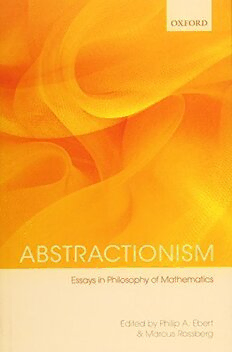Table Of Contenti i
“Abstractionism_OUP” — 2016/10/19 — 0:48 — page 1 — #1
i i
ABSTRACTIONISM
i i
i i
i i
“Abstractionism_OUP” — 2016/10/19 — 0:48 — page 2 — #2
i i
i i
i i
i i
“Abstractionism_OUP” — 2016/10/19 — 0:48 — page iii — #3
i i
Abstractionism
Essays in Philosophy of Mathematics
Editedby
PHILIP A. EBERT
and
MARCUS ROSSBERG
i i
i i
i i
“Abstractionism_OUP” — 2016/10/19 — 0:48 — page iv — #4
i i
3
Great Clarendon Street, Oxford, Ox2 6dp,
United Kingdom
Oxford University press is a department of the University of Oxford.
It furthers the University’s objective of excellence in research, scholarship,
and education by publishing worldwide. Oxford is a registered trade mark of
Oxford University press in the UK and in certain other countries
© the several contributors 2016
The moral rights of the authors have been asserted
First Edition published in 2016
Impression: 1
All rights reserved. No part of this publication may be reproduced, stored in
a retrieval system, or transmitted, in any form or by any means, without the
prior permission in writing of Oxford University press, or as expressly permitted
by law, by licence or under terms agreed with the appropriate reprographics
rights organization. Enquiries concerning reproduction outside the scope of the
above should be sent to the Rights department, Oxford University press, at the
address above
You must not circulate this work in any other form
and you must impose this same condition on any acquirer
published in the United States of America by Oxford University press
198 Madison Avenue, New York, NY 10016, United States of America
British Library Cataloguing in publication data
data available
Library of Congress Control Number: 2016948397
ISBN 978–0–19–964526–8
printed in Great Britain by
Clays Ltd, St Ives plc
Links to third party websites are provided by Oxford in good faith and
for information only. Oxford disclaims any responsibility for the materials
contained in any third party website referenced in this work.
i i
i i
i i
“Abstractionism_OUP” — 2016/10/19 — 0:48 — page v — #5
i i
Contents
I Introduction
1 IntroductiontoAbstractionism 3
PhilipA.EbertandMarcusRossberg
II Semantics and Ontology of Abstraction
2 CaesarandCircularity 37
WilliamStirton
3 TheExistence(andNon-existence)ofAbstractObjects 50
RichardG.Heck,Jr.
4 HaleandWrightontheMetaontologyofNeo-Fregeanism 79
MattiEklund
5 Neo-FregeanMeta-Ontology:
JustDon’tAskTooManyQuestions 94
FraserMacBride
6 TheNumberofPlanets,aNumber-ReferringTerm? 113
FriederikeMoltmann
III Epistemology of Abstraction
7 AFrameworkforImplicitDefinitionsandtheAPriori 133
PhilipA.Ebert
8 AbstractionandEpistemicEntitlement:
OntheEpistemologicalStatusofHume’sPrinciple 161
CrispinWright
9 Hume’sPrincipleandEntitlement:
OntheEpistemologyoftheNeo-FregeanProgram 186
NikolajJangLeeLindingPedersen
10 Neo-FregeanismReconsidered 203
AgustínRayo
i i
i i
i i
“Abstractionism_OUP” — 2016/10/19 — 0:48 — page vi — #6
i i
vi Contents
IV Mathematics of Abstraction
11 Conservativeness,Cardinality,andBadCompany 223
RoyT.Cook
12 ImpredicativityintheNeo-FregeanProgram 247
ØysteinLinnebo
13 AbstractionGrounded:ANoteonAbstractionandTruth 269
HannesLeitgeb
14 IneffabilitywithintheLimitsofAbstractionAlone 283
StewartShapiroandGabrielUzquiano
V Application Constraint
15 OnFrege’sApplicationsConstraint 311
PaulMcCallion
16 ApplicationsofComplexNumbersandQuaternions: Historical
Remarks,withaNoteonCliffordAlgebra 323
PeterSimons
17 DefinitionsofNumbersandTheirApplications 332
BobHale
Index 349
i i
i i
i i
“Abstractionism_OUP” — 2016/10/19 — 0:48 — page 1 — #7
i i
Part I
Introduction
i i
i i
i i
“Abstractionism_OUP” — 2016/10/19 — 0:48 — page 2 — #8
i i
i i
i i
i i
“Abstractionism_OUP” — 2016/10/19 — 0:48 — page 3 — #9
i i
1
Introduction to Abstractionism
Philip A. Ebert and Marcus Rossberg
1.1 WHATISABSTRACTIONISM?
Abstractionism in the philosophy of mathematics has its origins in Gottlob
Frege’slogicism—apositionFregedevelopedinthelatenineteenthandearly
twentiethcentury.Frege’smainaimwastoreducearithmeticandanalysisto
logic in order to provide a secure foundation for mathematical knowledge.
Asiswellknown,Frege’sdevelopmentoflogicismfailed.TheinfamousBasic
LawV—oneofthesixbasiclawsoflogicFregeproposedinhismagnumopus
GrundgesetzederArithmetik—issubjecttoRussell’sParadox.Thestrikingfea-
tureofFrege’sBasicLawVisthatittakestheformofanabstractionprinciple.
Thegeneralformofanabstractionprinciplecanbesymbolizedlikethis:1
x(cid:11)=x(cid:12) $ (cid:11)(cid:24)(cid:12)
where‘x’isaterm-formingoperatorapplicabletoexpressionofthetypeof(cid:11)
and(cid:12),and(cid:24)isanequivalencerelationonentitiesdenotedbyexpressionsof
that type. Accordingly, abstraction principles are biconditionals that feature
an equivalence relation on the right-hand side and an identity statement on
the left-hand side. The abstracta denoted by the terms featuring in the iden-
tity statement on the left are taken to be introduced, in some sense, by the
abstraction principle, giving the equivalence on the right-hand side concep-
tualpriorityoverthem.Moreonthisbelow.
Frege’sill-fatedBasicLawV,involvesco-extentionality(offunctions)asthe
relevantequivalencerelationontheright-handside,introducing,whatFrege
(cid:21)
termedvalue-ranges,"φ("),ontheleft:2
1Hereandbelow,wewillomitprefixeduniversalquantifiersinabstractionprinciples.We
aretherebyineffectneglectingthedistinctionbetweenschematic andaxiomatic (oruniversal)
formulationsofabstractionprinciples.Inthecontextoffullimpredicativesecond-orderlogic,
theseformulationsareequivalent,butinsystemswithweakersecond-ordercomprehension(see
page21below),thesecomeapart:theschematicformulationsentailtheaxiomaticones,butnot
viceversa;seee.g.Heck(1996,§1),Fine(2002,36–38),orLinnebo(2004,158).
2Inwords:Thevalue-rangeoffunctionf isidenticaltothevalue-rangeoffunctiongifand
onlyiff andghavethesamevalueforanyargument.Thevalue-rangeofafunctionisroughly
i i
i i

